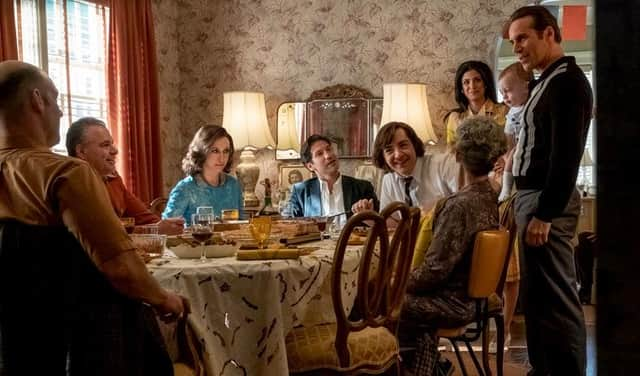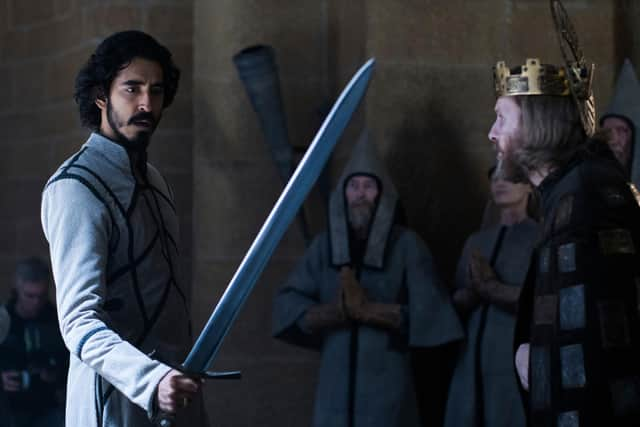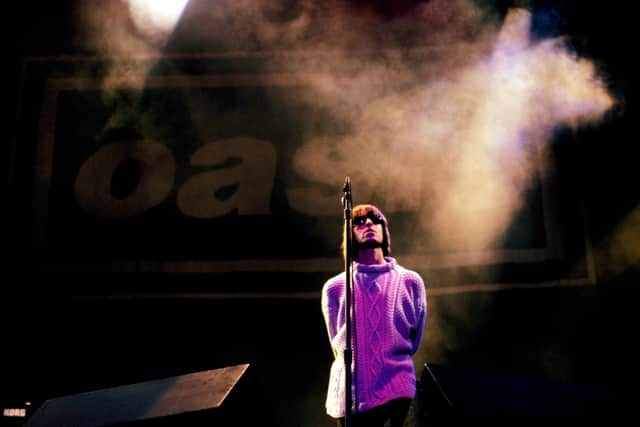Film reviews: The Many Saints of Newark | The Green Knight | Oasis Knebworth 1996


The Many Saints of Newark (15) ****
The Green Knight (15) ****
Oasis Knebworth 1996 (15) **
It’s a bold move for The Sopranos prequel The Many Saints of Newark not to feature the ground-breaking TV show’s eponymous crime family anywhere in its title. Think of it, though, as a statement of intent. It may boast a superlative casting coup by featuring Michael Gandolfini in the role that made his late father, James, a star, but this isn’t some nostalgic cash-grab designed to squeeze money out of a groundbreaking TV show; it’s a richly textured work in its own right that makes full use of its status as a movie to tell Tony Soprano’s origins story in a creatively interesting way.
But there’s another reason not to feature the Soprano name in the title. Picking up on an idea from the show’s first season involving Tony’s tendency to think of himself in his therapy sessions as a victim of fate rather than someone with agency over his own life choices, the film makes him more of a passive character by telling his story through the prism of his favourite uncle, Dickie Moltisanti (Alessandro Nivola — excellent), whose son, Christopher, will one day be murdered by Tony. That’s not a spoiler: the movie begins in a cemetery full of restless spirits, one of whom happens to be the aforementioned Christopher, who assumes the role of the film’s beyond-the-grave narrator (he’s voiced by Michael Imperioli, who played him so memorably on the show).
Advertisement
Hide AdThe first half of the film is set in 1967 and is really about how Dickie finds himself trapped in a kind of Oedipal nightmare as he tries to escape the shadow of his fascistic gangster father (played by Ray Liotta) whose new Italian wife (Michela De Rossi) Dickie is instantly attracted to. As the film lays out the intricacies of this world, director Alan Taylor (a veteran of the show) attempts to brings something new to the table with incredibly lived-in characters – Vera Fermiga as Tony’s monstrous mother Livia is especially good – but also by showing how this insular world can’t escape the forces of history. Dickie and his crew may be untouched by the Summer of Love, but they’re not untouched by the racial unrest also sweeping the nation. Indeed, there’s an audacious sequence involving a taxi ride that shows just how implicated in the Newark Race riots they are. But more than that, the film creates space to explore the fractious relationship between the Italian American and the Black communities via a meaty parallel plot involving Leslie Odom Jr as an aspiring gangster sick of doing Dickie’s dirty work. Greenbook this isn’t.
But where’s Tony in all of this? As the film jumps ahead a few years to the 1970s he becomes a more central figure, but still one buffeted about by familial chaos, be it the fallout from his beloved Uncle Dickie’s illegal activities, the psychological distress caused by his mother’s unacknowledged mental health issues, or the dispiriting presence of his just-released-from-prison father (Jon Bernthal). There’s a sweetness to the way Gandolfini plays him that amplifies the Shakespearean tragedy of it all; Tony is hardly a dewy-eyed innocent, but you can see in Gandolfini’s performance the light gradually fading from Tony as the weight of his family bears down upon him. It’s a great turn among many in a film that never puts a foot wrong.


The Green Knight finds A Ghost Story director David Lowery transforming the essence of the 14th century, Arthurian legend-riffing poem Sir Gawain and the Green Knight into an abstract, nightmarish interrogation of chivalric honour and the karmic cost of bolstering one’s own legend. Dev Patel takes the lead as Gawain, a callow, young, aspiring knight conflicted about his own inadequacies and lowly status, despite being nephew to King Arthur (Sean Harris) and Queen Guinevere (Kate Dickie). When his sorceress mother (Sarita Choudhury) summons the titular legend to test him (the knight takes the form of an arboreal abomination played by the ominously voiced Ralph Ineson), he’s so consumed with is own vainglorious quest for greatness that he misunderstands the nature of the challenge and lops off his opponent’s head, not realising the same fate will await him in a year’s time. On paper it’s a relatively simple plot, but Lowery teases out its moral complexities with his frequently beautiful, occasionally baffling, always visually rich storytelling style. Alicia Vikander and Joel Edgerton co-star.
The rapid mid-1990s ascent of Oasis is one of those pop-culture phenomena that felt exciting in the moment but is baffling in hindsight. That’s partly because the band’s regressive music hasn’t aged well, partly because Oasis’s determination to be the biggest band in the world isn’t much of a legacy. Both those aspects are depressingly evident in Oasis Knebworth 1996, Jake Scott’s tedious documentary about the titular record-breaking gigs that saw them play to 250,000 fans barely two years on from releasing their debut single. Mixing archival footage with newly recorded audio interviews, the film has the occasional spark of insight from Noel Gallagher, but is largely is composed of banal testimony from fans content to echo Oasis's own grandiose claims about being “a part of history.” Frontman Liam Gallagher’s description of the gigs as “Woodstock for the 90s” sums up the problem of trying to define a moment in time using a band nostalgic for a radically different era.
The Many Saints of Newark is in cinemas from 22 September; The Green Knight is on select release and streaming on Amazon Prime from 25 September; Oasis Knebworth 1996 is in cinemas from 23 September.
A message from the Editor:


Thank you for reading this article. We're more reliant on your support than ever as the shift in consumer habits brought about by coronavirus impacts our advertisers.
If you haven't already, please consider supporting our trusted, fact-checked journalism by taking out a digital subscription at https://www.scotsman.com/subscriptions